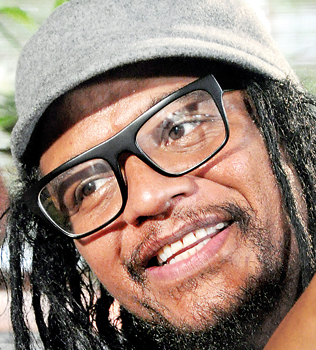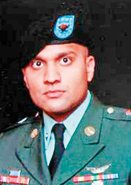This is ME !
Growing up Sri Lankan, Hindu and transgender in Lancaster, U.S.A would give D’Lo all the material he ever needed to be a comedian. His stories about a little boy “trapped” in the body of a girl born to conservative, immigrant Tamil parents are as hilarious as they’re heart wrenching; and they’re what he brought to the stage of the Punchi Theatre in Colombo for his first public performance in Sri Lanka last month.
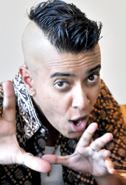
Challenging his audience: D’Lo in Colombo. Pic by Mangala Weerasekara
We meet D’Lo later, in the pause between a six-city tour of India and his return to L.A, from where he will begin touring the U.S again in October. Both metaphorically and literally, D’Lo wears many hats: he is a playwright (‘Boys that Pray’ and ‘Ballin’ with My Boys’) and has worked collaboratively with numerous artists.
He has performed, conducted writing workshops and facilitated theatre in US, Canada, UK, Germany, Sri Lanka and India and his work has been published in various anthologies and academic journals. With a BA in Ethnomusicology from UCLA and a degree from New York’s School of Audio Engineering, he is also a music producer and sound designer. D’Lo has been featured on MTV and has several widely toured shows, including his current show ‘DeFunQT’ and ‘Ramble-Ations’ which received the NPN Creation Fund Grant inclusive of residencies in eight US cities.
At the Punchi Theatre, he seemed to delight in blurring gender and identity – whether he was deftly winding a saree around himself in preparation to play his mother (a startling transformation he completed with lipstick, earrings and long wig), playing Uncle G (who has an obsession with Gandhi) or performing purely in silhouette. His mother was in the audience and when D’Lo ended his show by encouraging us never to give up on our loved ones, he seemed to speak directly to her.
D’Lo has visited Sri Lanka many times with his parents. His father, a doctor from Jaffna migrated to the U.S in the 70s in search of a better life for his fledgling family. D’Lo’s mother, an accomplished painter and hot chocolate gourmand, kept their home. The couple’s two daughters couldn’t have been more unalike – D’Lo remembers his elder sister Krishani as close to perfect, while he himself was, well, not.
Growing up, he chafed within his own skin and wanted nothing more than to be like his father. (They would often stand side by side in front of the bathroom mirror, his father shaving and D’Lo pretending to.) Strangers routinely mistook him for a boy – complimenting his parents on their “fine” lad.
For his ‘periya pillai’ ceremony (he was 11 when he got his first period), his family decked him out in a rich saree, with flowers in his hair and jewellery around his neck. In pictures, D’Lo is a little wild around the eyes, wanting nothing so much as to utterly reject his new found womanhood – only able to keep his composure because Krishani had calmed him down. “I felt my whole world crash around me…Around that time I was already getting the questions and I already knew that that was not cool, that people hated gays and queers and homosexuals,” he remembers.
He was 13 when Krishani died, killed instantaneously in Los Angeles along with nine other passengers when an airport traffic controller misdirected a Boeing 737 so that it landed on their much smaller plane, crushing it before it had even taken off. In his show, D’Lo talks about how devastating the loss was for his family: “The house we lived in was under a huge, heavy, dark grey cloud and all my aunties and uncles were like ‘You have to take care of Amma and Appa now Dilo,’ But I was hella angry at my sister for dying.” Looking up, he shakes a fist. “I’m gay, fool. How am I going to come out now?”
In a documentary made about D’Lo by Crescent Diamond called ‘Performing Girl’ (soon to be released) D’Lo’s mother remembers her young daughter telling her that she wished she had died instead. “She [Krishani] was going to fulfil each of my parent’s dreams, she was going to become a doctor, get married to a successful guy, have some kids. Instead they got stuck with the nightmare,” D’Lo says. At home the arguments only got worse. His father remembers D’Lo, who he still refers to as ‘her’, walking around with the waist of his jeans at “thigh level,” with multiple “nuts and bolts” (i.e. piercings).
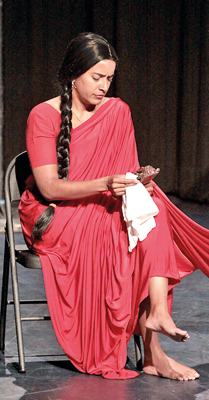 |
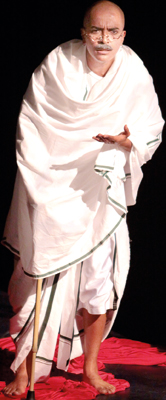 |
“At that time, I didn’t know that all these things would culminate in some kind of different orientation,” he says in the documentary.
Despite all the painful history that came before, D’Lo’s coming out had something of the comic about it. He narrates the conversation as part of his show: it begins when his father calls D’Lo to tell him he has found him two men to choose from, brothers who are doctors from North Carolina. “Two men for me, Appa? What for?” is D’Lo’s befuddled response. Further down the line, with the marriage proposal forgotten, his father demands: “What are you trying to tell me? Are you gay? Don’t tell me you’re gay! You’re not gay! Are you gay?”
D’Lo feared that he and his mother would stop talking (again) when he told her about his double mastectomy in 2009. For him it was the “best, most personal, selfish, beautiful decision I had ever made in my life.” Looking back he explains “I know people might think it’s cosmetic if they don’t understand what it means to be transgender. Getting a double mastectomy was like going back to the body I had left pre-puberty.” When he told her, his mother was silent. The only thing she wanted to know was who had been with him during the surgery.
Later that day, she addressed him as ‘he’ for the first time.For someone who hasn’t seen the performance, it might be hard to imagine how D’Lo could turn such painfully personal stories into anecdotes that make his audiences roar with mirth. “I always say comedy is tragedy given time. When you start laughing at the stuff that’s happened to you, that’s painful, that’s your litmus test – you’re like ‘oh, I’ve graduated from that.’ That’s your certificate of completion and while you’re in the process and you’re joking about it, it also helps you get to the next moment. I feel like comedy is one of the most magical tools we have.”
D’Lo claims the stage with joy – it’s his sacred space, one that has grounded him and where he says he feels he’s at “the best of my beauty”. It’s also where he challenges his audience to think outside the usual constraints of gender and sexuality. D’Lo looks like a man but sounds like “Mickey Mouse,” and while going on hormone therapy would have him “sounding like a guy within a month,” D’Lo doesn’t want to lose the ability he has now to convincingly play both genders; in essence, to be the kind of artist he is.
He sums up his manifesto: “I think there’s something very beautifully queer about being able to be in a body that can play all these roles…For me my queerness, is my social justice politic. I would rather be visible in a world that pushes me to be invisible than be invisible because I fit in. If I wasn’t an artist and I didn’t have this politic, I’d already be on hormones. I’d be a man riding a cab somewhere. The politic also frames who you are – yes I know I was born 50 years too early, but if I don’t do this work, in this way, in the best way I know how to do, then how am I forging the path?”
Follow @timesonlinelk
comments powered by Disqus




















